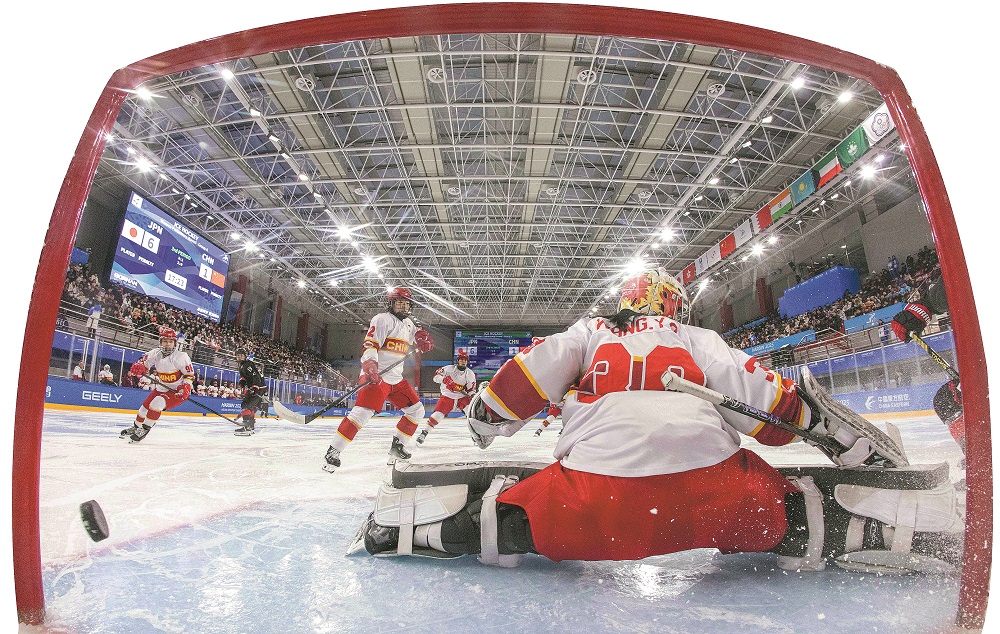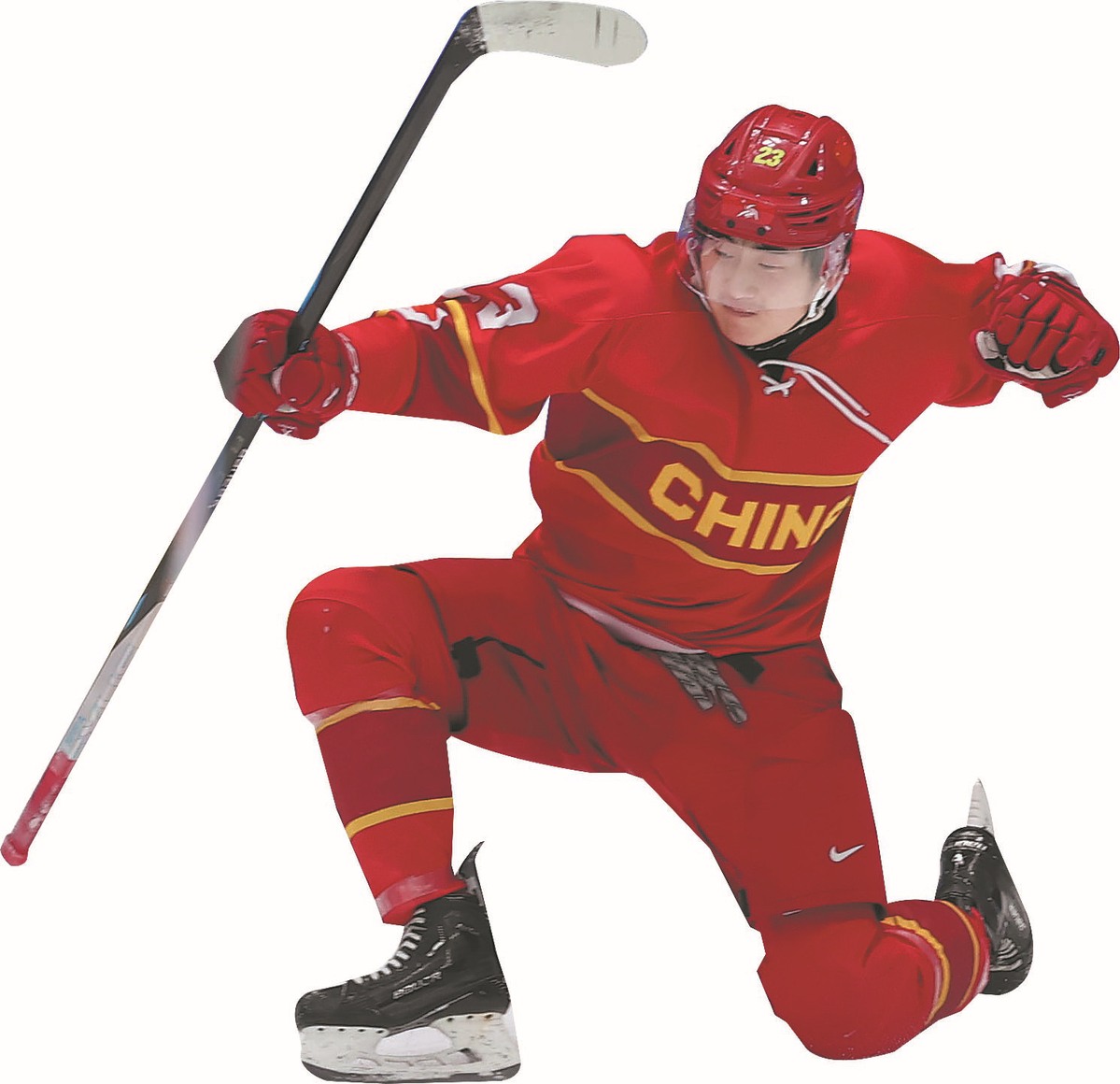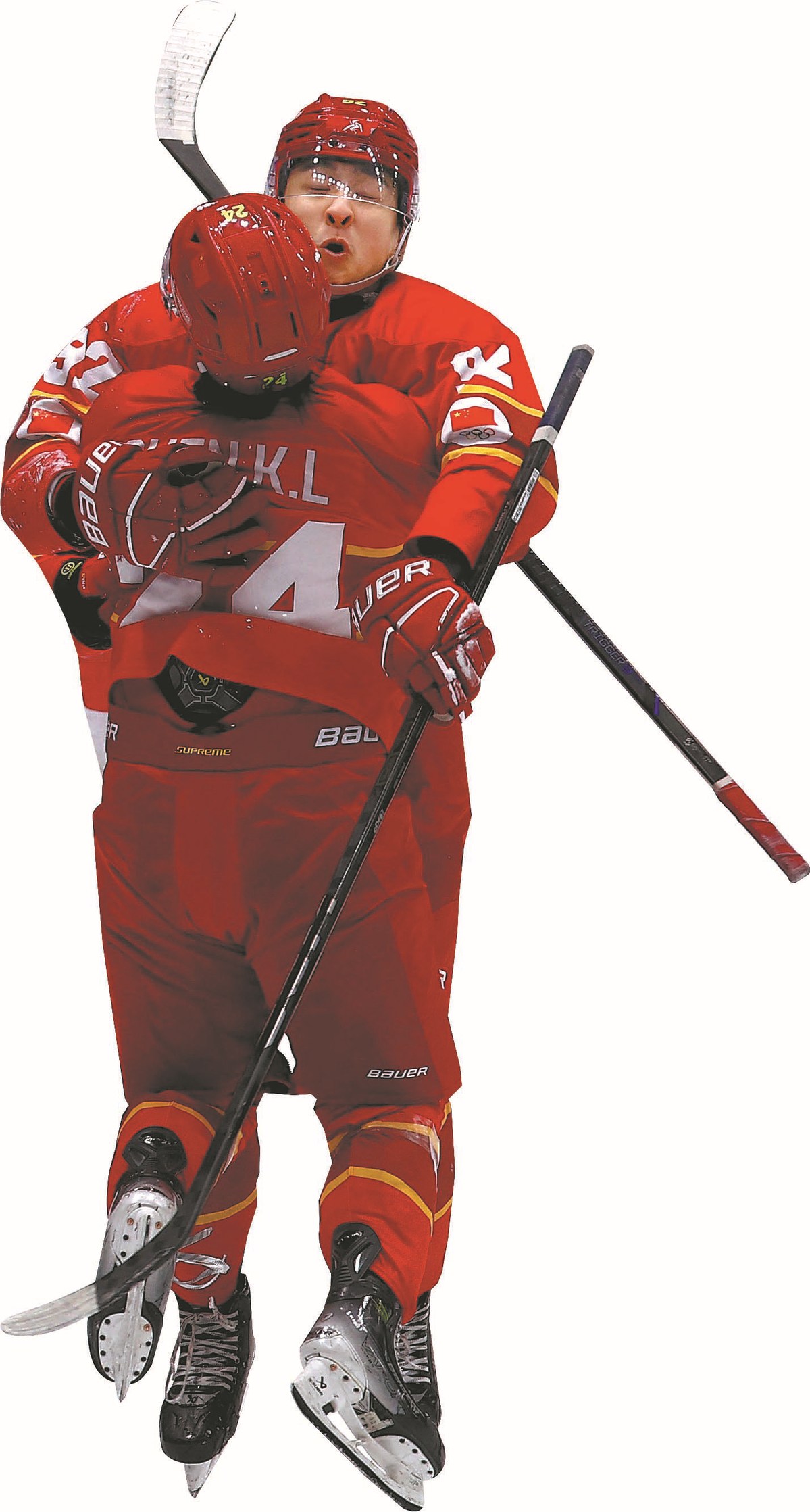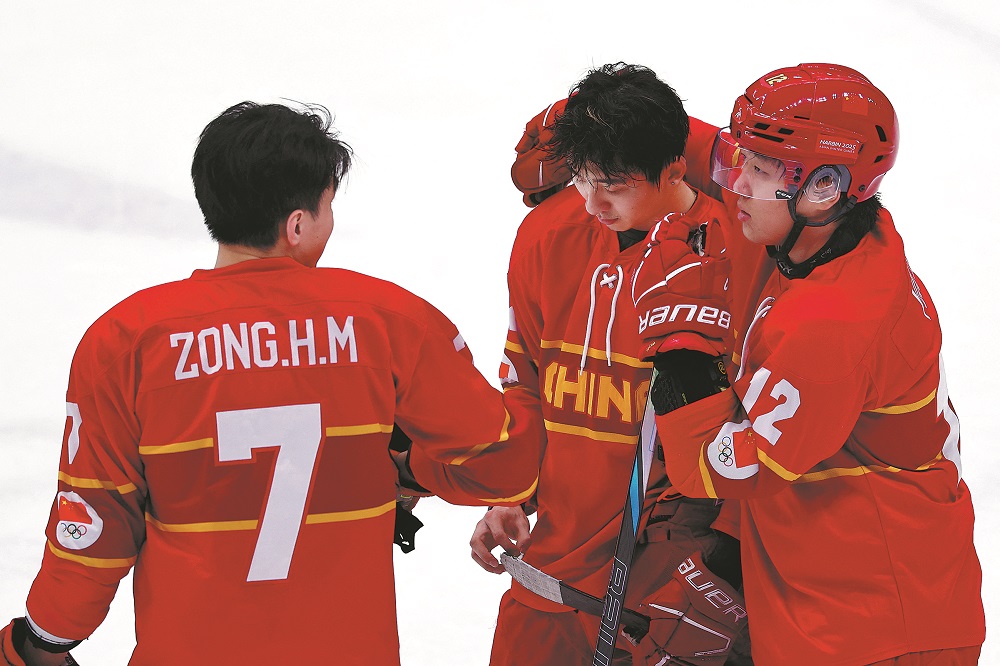
The puck evades Chinese goalie Wang Yuqing during an 8-1 loss to Japan on Feb 14 in the Asian Winter Games women's ice hockey competition in Harbin, Heilongjiang province. China finished third, behind Japan and Kazakhstan. XINHUA
Not the finish they wanted, but China's fresh-faced pucksters have drawn strength from a hard-fought Winter Asiad campaign, as the country's hockey program looks to hit the reset button.
The Chinese national ice hockey program's gamble of casting aside an experienced legion of naturalized players to field all-homegrown squads at major tournaments has not quite paid off. A string of disappointing results for both its men's and women's teams over the past two weeks have cost it dearly on the international and regional stages.
Having missed the Olympic qualification berth for Milano-Cortina 2026 long ago, the Chinese men's squad was hoping to energize its rebuilding efforts with a medal finish at the Harbin Asian Winter Games last week, yet only managed to emerge with a sobering reality check regarding the gap between itself and the sport's continental powers.
The gap is narrowing, though, as evidenced by closer matches against three-time Asiad champion Kazakhstan and higher-ranked East Asian neighbors Japan and South Korea in Harbin, compared to the 2017 edition in Sapporo, Japan.

Li Zhihao celebrates scoring during the Games' men's bronze-medal match against South Korea, which China lost 5-2. XINHUA
"It's disappointing that we didn't achieve what we set out to do (to win a medal on home ice again). At the moment, it just sucks that we are still not good enough to beat them, even though we did all that we could," Team China's co-captain Zhang Zesen said after a 5-2 loss to South Korea in the men's bronze-medal match at the Harbin Games last Friday.
"We won't give up, though. Even finishing without a medal, we've shown quite an improvement here," said the Harbin native, who was born in 1996 just a few months after his predecessors won bronze in the men's hockey at the 3rd Asian Winter Games, also held in the Heilongjiang provincial capital.
"We tried, and we failed again, but I think it's obvious that we failed better," said the 28-year-old forward, who contributed 10 points, the team's second-highest tally, from four goals and six assists in all eight games.
Firing in 10 goals while conceding 22 across five games against the Asian top-three in Harbin, the Chinese men have, at least, well outperformed themselves, compared to the 2017 edition, where they were held scoreless against the same three opponents, while conceding 32 goals in three games.
Currently ranked 26th in the world and fourth in Asia, China's men had approached the home Winter Asiad on a mission to prove they were underrated, drawing confidence from a third-placed finish at November's Asian championships in Kazakhstan, where they beat South Korea for the first time in 18 years — 2-1 in overtime — to claim bronze in Almaty.

Hou Yuyang celebrates scoring China's first goal with Chen Kailin during an Asian Winter Games men's group match against Japan on Feb 10. REUTERS
However, a lack of experience, consistency and focus at clutch moments, exposed by squandered early leads in several key matches in Harbin, took a toll on the team's ambition and provided a stark reminder of the catching-up required to match its continental rivals.
"Obviously, we are not mature enough. In a couple of matches, we made mistakes right after we scored, letting the opponents get back on their feet quickly and come back to beat us," captain Zhang Jiaqi said after the team's 3-1 semifinal loss to Kazakhstan.
With an average age of 24, the current Chinese men's team is ushering in a new era with the Chinese Ice Hockey Association pinning high hopes on an all-homegrown roster.
The bold initiative of bolstering the national teams, including the women's squad, with North American-born players with Chinese heritage, such as former NHL veteran Brandon Yip, was implemented by CIHA in 2017 in a desperate move to toughen the host up before the 2022 Beijing Winter Olympics.
It was quickly abandoned, though, after a reshuffle of CIHA leadership, currently chaired by president Wang Xuan, who has reiterated the focus on growing China's own talent system since being elected the new chief in July 2022.

China's Zong Hanming and Yu Jilong console teammate Guo Jianing after losing the Asian Winter Games men's bronze-medal match against South Korea in Harbin on Feb 14. REUTERS
The CIHA backed up its new policy by launching revamped domestic women's and men's leagues at the end of 2023 and 2024, respectively, with both men's and women's clubs allowed to sign import players for the first time in history.
"I think it's a good start," Zhang said of the 2024-25 men's league season, which will kick off its semifinal phase next month in Beijing, with four clubs fighting for the inaugural national title.
"We need to play more games on a more consistent basis, and I think the league has built a much better platform than the old-format national championships we had," said Zhang, who was on the 2022 Beijing Winter Olympic roster.
On the women's side, the home Winter Asiad could've offered a redemption for its failure to earn itself a 2026 Olympic ticket at the final qualification tournament, which took place just before the Harbin Games in Hokkaido, Japan.
However, the emotional blow and physical toll of missing out on the sole Olympic quota place on offer, eventually secured by the host Japan, proved too much for the worn-out Chinese squad which failed to fully regroup for the continental event.
The Chinese women were defeated again by Japan, 8-1, in its final round-robin match in Harbin last Friday, following its 4-1 loss to the same opponent in the Olympic qualifier on Feb 9, eventually settling for bronze in Harbin, trailing Japan and runner-up Kazakhstan.
"We did all we could at the Olympic qualifying tournament and we couldn't recover enough to perform as hard as we needed to here," the women's team captain Yu Baiwei said after the loss.
"We are now experiencing a transitional period, with the younger generation coming up quickly. They just need time to grow. We have to set our sights on the future," said the 36-year-old defender.